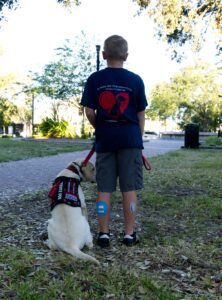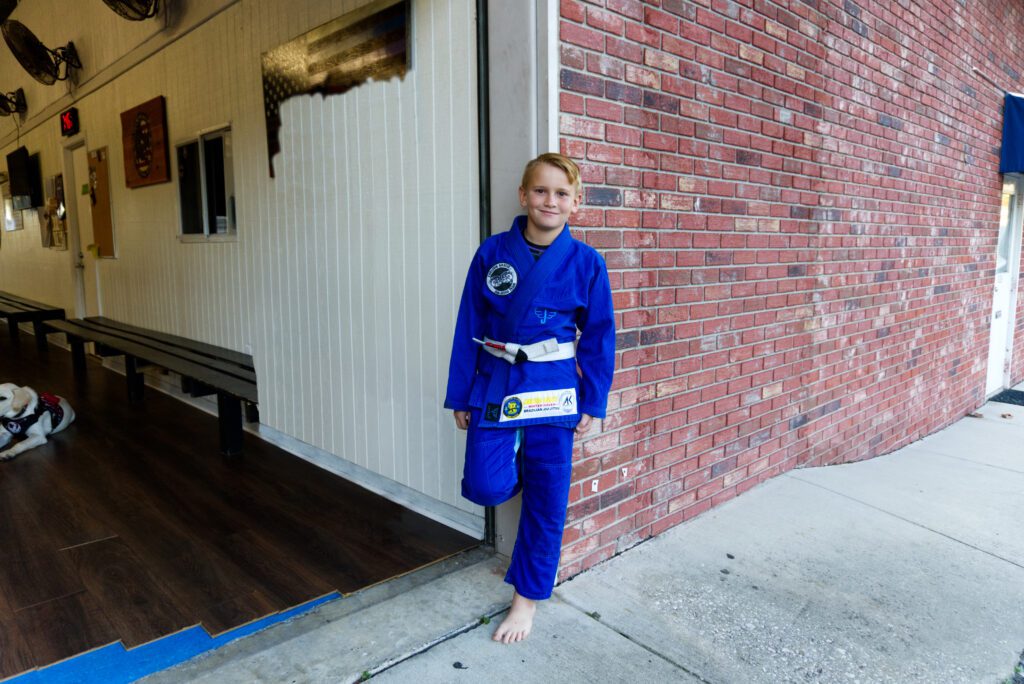Boy Takes Control of Diagnosis to Dream Big
story by KRISTEN GUEVARA
photos by TYLER DIGIOVINE
A typical 11-year-old likely doesn’t prefer the company of a snitch, but for one Lake Wales boy in particular — it’s exactly what he wants.
In 2018, Weston Watson was diagnosed with type 1 diabetes — commonly referred to as T1D — at just 7 years old. But sitting on the sidelines is not how he intends
to live his life. Active in multiple sports, including Gracie jiu jitsu and soccer, Weston is determined to maintain his athletic lifestyle regardless of his diagnosis.
Weston’s parents, Chris and Bianca Watson, say they first noticed something was wrong when their energetic son began showing troubling symptoms. They began to notice bed-wetting, weight loss, excessive thirst, frequent urination, chronic fatigue, and excessive agitation. Simply put: Their son was not himself.
During a trip to Disney, Weston’s parents noticed their typically active son was exhausted and spent most of his time lying in a lounge chair beside the pool. That fatigue is what prompted them to take him to a doctor.
At the pediatrician’s office, Weston’s urine glucose levels were in the 300s. Normal blood sugar levels vary between about 60 and 140 mg/dl. Concerned about this spike, his pediatrician sent him directly to the emergency room at Johns Hopkins All Children’s Hospital in St. Petersburg. By the time Weston arrived at the ER, his glucose levels had spiked to the 700s. The doctors immediately started him on an insulin drip to lower his blood sugar and admitted him to the ICU, where he stayed for three days. Although slightly lethargic, Weston remained calm and collected throughout the process of his diagnosis and hospital stay. “He never fussed once,” his mother said.
“When I got my energy back, all I wanted to do was go to the hospital game room and play games like bingo,” Weston remembers.
The T1D diagnosis left the family in shock. With no family history of auto-immune disorders or diabetes, they were blindly thrust into a world of unknowns. The intake nurse, who was also diabetic, inspired the family and gave them hope that Weston could still go on to live a normal, vibrant life.
Before leaving the hospital, Weston was given a unique gift — a stuffed animal he still treasures named Rufus. Rufus was equipped with hard paws and puncture points so Weston could practice finger pricks and insulin injections.
For the first six months after his diagnosis, Weston had to prick his finger to check his blood sugar after every meal and when he wasn’t feeling well. He had to take an insulin shot every time he ate to balance his glucose levels. He also took a daily shot that provided long-lasting insulin.
After six months, Weston was able to get a Dexcom device, which continuously tracks his glucose levels, as well as an Omnipod, which automatically delivers insulin directly into his body. These disposable devices, currently worn on his calves, are entirely free of tubes, so they don’t interfere with any of his daily activities. Weston has bravely taken full responsibility for changing his Dexcom every 10 days, and his Omnipod every few days.

Weston’s parents say he can maintain his regular diet as long as he keeps a record of his carb intake so he can get the correct amount of insulin to make up for it. Weston says taking charge of the tracking and calculations has sharpened his math skills. “Math is my favorite subject,” he remarks.
As advanced as these devices are, they are still about 15 minutes behind in alerting Weston of a dangerous blood-sugar fluctuation.
That’s where the snitch comes in. Snitch, an appropriately named 6-month-old diabetes-alert dog in training, was purchased with the help of fundraising from the Polk County Sheriff’s Office. The yellow lab can detect dangerous swings in blood sugar roughly 15 minutes before they occur.

“When I get busy playing my video games and forget to pay attention to my blood sugar, Snitch nudges me,” Weston says.
Once Snitch’s training is complete, he will accompany Weston everywhere, including school. This will provide an added layer of protection for Weston and further peace of mind for his family.
Now fully versed in T1D and his medical needs, Weston doesn’t let anything get in the way of the sports he loves.
“I am almost a gray belt,” he says excitedly of his jiu-jitsu training. “I want to play football, too.”
Weston is inspired by athletes who also deal with T1D, and he dreams of one day becoming a professional soccer player.
“I got to meet Jordan Morris, a professional soccer player who is also a T1D!” he brags.
Weston sends a strong message to his peers: “Continue to be you. Don’t change; continue your dreams.”
Chris Watson is proud of how his son has stepped up and become a mentor for peers who also have T1D.
“Since day one, he’s taken an active role in his diabetes,” he says, “and he shepherds others who are young and dealing with this.”
When talking with others, Chris Watson openly discusses the first symptoms he saw in his son to raise awareness in recognizing the disease.
“I encourage parents to look out for the warning signs in their children or children around them,” he says.
Bianca Watson says it’s important for new T1D parents to be mindful of how they approach the diagnosis.
“It’s about mind over matter,” she says. “How you respond to things is how your child will respond to things as well. It is scary, but you’ll get through it.”
